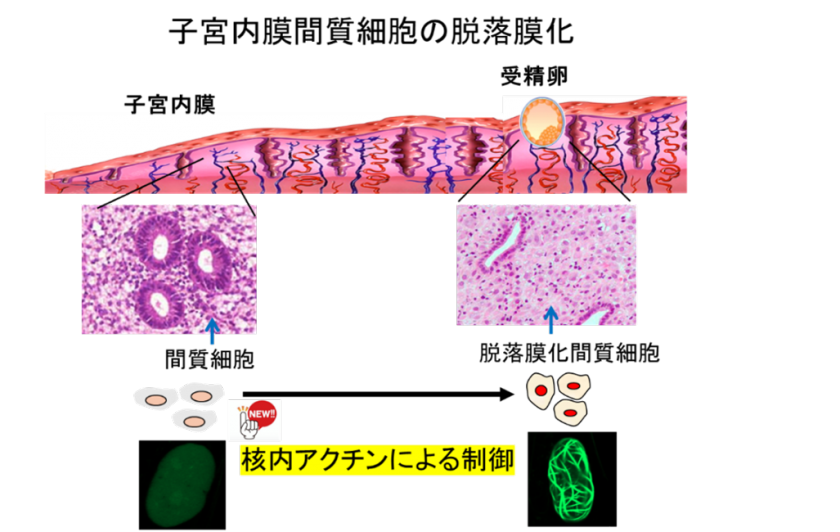Prof. MIYAMOTO and his research group have revealed a new regulatory mechanism involved in human implantation.
POINT
- Endometrial stromal cells, in which the behavior of nuclear actin can be visualized, were established and used to study the cellular process referred to as decidualization, which is essential for implantation and maintenance of pregnancy.
- For the first time in the world, the team has clarified that decidualization, which is required for human embryo implantation, is regulated by changes in actin protein dynamics in the cell nucleus.
- The research team also identified transcription factor C/EBPb as a regulator of nuclear actin assembly.
- It is expected to elucidate new mechanisms involved in human implantation and contribute to the development of treatments for patients with infertility caused by implantation failure.
SUMMARY
A research group led by Lecturer Dr. Isao Tamura and Professor Dr. Norihiro Sugino at the Department of Obstetrics and Gynecology, Graduate School of Medicine, Yamaguchi University (President: Yukio Tanizawa) and Professor Dr. Kei Miyamoto (affiliated with Kindai University until March 2024) at the Department of Animal Reproductive Physiology, Faculty of Agriculture, Kyushu University (President: Tatsuro Ishibashi) has revealed that the phenomenon of decidualization*1 which is required for implantation*2 of human embryos, is regulated by changes in the dynamics of actin*3 protein in the cell nucleus.
Implantation is the first step in the process of establishing pregnancy, in which the fertilized embryo attaches to and infiltrates the endometrium. During this process, various changes are induced in the endometrium to accommodate the fertilized embryo. One of these changes, decidualization of endometrial stromal cells, is a unique phenomenon in which cells undergo dramatic functional and morphological changes under the influence of hormones and is essential for implantation and maintenance of pregnancy. When decidualization is disrupted, the fertilized embryo cannot be accepted, resulting in implantation failure and infertility. The regulatory mechanism of decidualization is not yet fully understood.
In recent years, it has become clear that actin protein, a component of the cytoskeleton, exists not only in the cytoplasm but also in the nucleus, and its role in the regulation of gene expression*4 has attracted attention. The research group observed changes in the nucleus of human cells undergoing decidualization and discovered that actin polymerizes to form a special structure with fibers (Fig. 1). The group has also shown that this nuclear actin polymerization plays an important role in the induction of decidualization. This research elucidates new mechanisms involved in human implantation and contributes to the development of treatments for patients with infertility caused by implantation failure.
The results of this study were published in Communications Biology on July 11, 2024 (10:00 a.m. London time).

GLOSSARY
*1 decidualization
The endometrium is composed mainly of epithelial cells and stromal cells. The stromal cells undergo a morphological and functional differentiation called decidualization toward the implantation stage. This process is essential for the establishment and maintenance of pregnancy, and failure of decidualization can cause implantation failure. During the process of decidualization, many changes in gene expression and cellular function are induced that are necessary for implantation to occur.
*2 implantation
The adhesion of a fertilized embryo, created by the fertilization of an egg and sperm, to the endometrium in the uterus. This is the first step in pregnancy. If the function of the endometrium is impaired with various reasons, implantation failure can occur, related to infertility.
*3 actin
A component of the cytoskeleton, actin was previously thought to exist only in the cytoplasm. However, recent studies have revealed that actin also exists in the nucleus. Furthermore, actin exists in monomeric and / or polymeric forms and is thought to be involved in various events in the nucleus, including the regulation of gene expression.
*4 gene expression
In the cell nucleus, there is genomic DNA, which is transcribed into RNA, and finally proteins are produced from the RNA. This sequence of events is called gene expression, and it is essential for us to carry out biological activities.
Paper Information
Publication:Communications Biology
Title:Nuclear actin assembly is an integral part of decidualization in human endometrial stromal cells
Authors: Isao Tamura, Kei Miyamoto, Chiharu Hatanaka, Amon Shiroshita, Taishi Fujimura, Yuichiro Shirafuta, Yumiko Mihara, Ryo Maekawa, Toshiaki Taketani, Shun Sato, Kazuya Matsumoto, Hiroshi Tamura, Norihiro Sugino
DOI :10.1038/s42003-024-06492-z
Research-related inquiries
MIYAMOTO Kei , Professor












 Contact
Contact
 Access Map
Access Map

